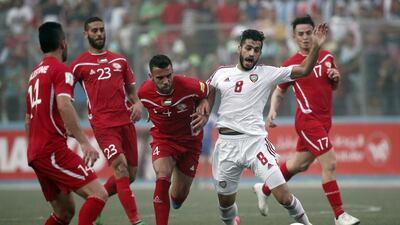Majed Hassan and Habib Fardan faced one of their most difficult challenges for Al Ahli last week, but they not only survived, they thrived.
Pitched at the base of midfield for the Asian Champions League first leg against Al Hilal in Riyadh, the pair excelled, squeezing space, closing opponents, pressing and pinning back the hosts. Ahli emerged with a 1-1 draw. The collective secured success, but it was built on the intelligence and endeavour of Ahli’s midfield pivot. They provided the platform.
It offered Mahdi Ali, coach of the UAE national team, food for thought, too: do Hassan and Fardan now represent his strongest midfield partnership? Have they overtaken Khamis Esmail and Amer Abdulrahman for those two slots?
Their case is certainly growing. Fardan and Hassan have similar traits — accomplished passers, pressers, game savvy — but they also complement each other. Hassan is strong, combative, tenacious. Fardan supplies more craft and possesses better distribution. Crucially, though, they have developed a strong understanding of each other’s styles. In other words, they fit.
This season, Hassan and Fardan have featured as Ahli’s central cog, with Kwon Kyung-won reverting to defence. They have played all five matches across the Arabian Gulf League and Champions League alongside one another; Ahli have won four times, drawing the other.
UAE to play World Cup qualifier against Malaysia behind closed doors after Fifa action
It bodes well not only for club, but for country. The UAE face Saudi Arabia in a crucial 2018 World Cup qualifier in Jeddah on Thursday, without Esmail as he continues his convalescence from knee surgery. He is sidelined for at least eight weeks.
Esmail’s injury record is chequered: in the past three full seasons, he has played 55 of Al Jazira’s 78 league matches. At age 26, his reliability, unfortunately, is waning.
Meanwhile, during that same period, injury has restricted Amer Abdulrahman to 39 league appearances for Baniyas; 50 per cent of their programme. He is available this week, but at 26 his fitness record is cause for concern, too.
Typically, Esmail and Abdulrahman fill the slots at the back of Mahdi Ali’s midfield, as they did for the successful 2013 Gulf Cup campaign and during this year’s run to the Asian Cup semi-finals.
The emergence of Hassan and Fardan in tandem has altered the conversation, though. Undeniably, Abdulrahman remains an integral component — he sets the team’s tempo — but given his injury issues, an additional option is required.
At 23 and 24 respectively, Hassan and Fardan hold a more long-term appeal and provide a more stable solution. Hassan has encountered his own fitness problems, but his development has been rapid. He is held in particularly high regard at Ahli.
Fardan also, for he is finally justifying the reported Dh40 million Ahli paid Al Nasr two summers ago, a record for an Emirati player. After a disappointing first season, Fardan is the game-changer they envisioned.
As a midfield package, he and Hassan are pushing the Esmail-Abdulrahman axis hard.
It is timely, given there lays another tough test this week. Saudi top Group A after three rounds, with the UAE second. Realistically, Mahdi Ali’s men must return with at least a draw to maintain hopes of automatic qualification from topping the group. Previously, Esmail’s absence would have been deemed decisive, but the form of Hassan and Fardan eases anxieties.
As last week’s Champions League examination proved, they represent a proven partnership in the heat of battle. The UAE are undoubtedly better for it.
FOLLOW US ON TWITTER @NatSportUAE


